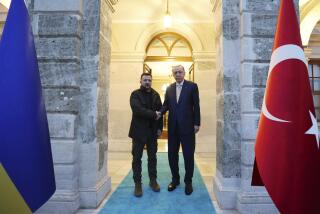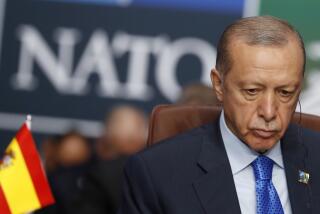Reforms Mark Turkey’s Hopes for EU’s Nod
ILICA, Turkey — For the last nine years, Osman Acar, his two wives and 22 children have spent most nights inside an 18-by-15- foot tent pitched outside this remote village in the mountains separating Turkey from Iraq.
Like about 60 other families here accused of giving food and shelter to separatist Kurdish rebels slipping across the border, the Acars were forced to live in a makeshift camp under surveillance of Turkish security forces. A unilateral truce called by the rebel group known as the PKK -- the Kurdistan Workers Party -- after the capture of their leader, Abdullah Ocalan, in 1999 did not alter the family’s plight.
“No water, no electricity, just lots of scorpions and snakes preying on our children,” said Acar, 56, gesturing toward a jumble of plastic sheeted tents. “Death has got to be better than this.”
Until recently, Acar’s hardships would have been brushed aside by Turkish authorities as a necessary evil in the army’s battle against the rebel group, which has renamed itself KADEK. More than a million Kurds were displaced and 3,000 of their villages either emptied or destroyed during the army’s effort to starve the rebels of popular support.
As peace was finally beginning to take hold, the rebels called off their cease-fire, saying the government had spurned for too long its demands to negotiate a lasting peace. About 70 rebels and 30 soldiers have died since then in clashes across predominantly Kurdish provinces.
When Ilica’s residents were allowed to return to their homes, their joy was tempered by disbelief. Some observers agree that the gesture shows how eager Turkey is to join the European Union.
Over the last two years, Turkey’s government has rammed through a raft of sweeping reforms tailored to overcome EU criticism of the country’s human rights record and what rights groups term the systematic repression of its 12 million to 14 million Kurds.
The government’s efforts were lauded in a report by the EU’s executive committee that was unveiled this month. It recommended opening membership negotiations with Ankara, and EU leaders are set to make a final decision on whether to launch the talks Dec. 17.
For the outcome to be positive, “it is crucial that between now and December, Turkey does not make any mistakes,” said an EU ambassador in Ankara, the Turkish capital. “That means ensuring the army does not fall into its old habits.”
Fears that the army might be doing just that resurfaced when security forces killed two villagers last month in the eastern province of Gumushane, saying that the men were KADEK rebels.
A full-scale investigation was quickly launched after protests that the men were just hunting wild boar when they were killed.
Elsewhere across the Kurdish region of Turkey, the military has responded to rebel attacks with unprecedented restraint.
“It is not just because of EU scrutiny,” said Ihsan Bal, a security analyst at the Ankara-based Police Academy. “It is because the PKK no longer poses a real threat.”
Five years of inertia and bitter internal feuding has sapped morale among about 4,000 rebels holed up in northern Iraq. Faced with possible attack by American forces there, hundreds of fighters have deserted, among them Ocalan’s brother and veteran commander, Osman, who said the Marxist-Leninist group had become irrelevant.
In another blow, the EU put the rebel group on its list of terrorist organizations this year.
More significantly perhaps, a growing number of Kurds who long venerated the rebels as freedom fighters are beginning to question the statements of their once-adored leaders. In recent years, Abdullah Ocalan renounced his demands for Kurdish independence. These days, he has accused EU governments of “trying to dismember Turkey.”
“Isn’t that what thousands of Kurds who believed in him all these years laid down their lives for?” asked Serafettin Elci, a veteran Kurdish politician who has long opposed the rebel group’s violent methods.
“The EU reform process is weakening Ocalan’s grip,” said Hasim Hasimi, a former Kurdish lawmaker. “The EU has robbed him of his role as the Kurds’ sole protector.”
The shift is palpable among officials of Turkey’s largest pro-Kurdish party, Dehap, or the Democratic People’s Party, seen by authorities as a political front for the rebel group.
“We condemn all forms of violence,” Osman Baydemir, the Dehap mayor of Diyarbakir, the largest predominantly Kurdish city in southeastern Turkey, said in a recent interview. “No matter who is responsible or why.”
Still Baydemir complains that many of the EU-inspired reforms are only on paper. Although bans on the Kurdish language were eased last year, Baydemir was recently slapped with two separate court cases by prosecutors for saying, “Hello, how are you? All will be well,” in Kurdish at rallies in Diyarbakir province.
Compared with the freedoms enjoyed by about 4 million Kurds in northern Iraq who have in effect ruled themselves since 1991, “allowing us to learn our language for the first time seems like too little too late,” echoed Firat Anli, the mayor of the Yenisehir district in Diyarbakir province.
Farther east, in the province of Van bordering Iran, locals say renewed violence is hurting their economy. Necip Baskin, a Kurdish businessman, said he invested half a million dollars in several new farms this year.
“We thought after five years of peace, why not?” Baskin said, adding that he has frozen the project. “It’s simply too risky.”
Others warn that unless the government creates jobs in the Kurdish provinces, where average unemployment runs about 70%, the rebel group will continue to find recruits.
In the town of Beytussebap, less than a mile from Ilica and about 900 miles from Ankara, hundreds of youths while away their time in coffee houses.
“There is only one fire engine for a population of 6,500,” said Ali Ataman, a local Dehap official. “Not a single Turkish prime minister has ever set foot here. We are the stepchildren of the [Turkish] Republic.”
More to Read
Sign up for Essential California
The most important California stories and recommendations in your inbox every morning.
You may occasionally receive promotional content from the Los Angeles Times.










